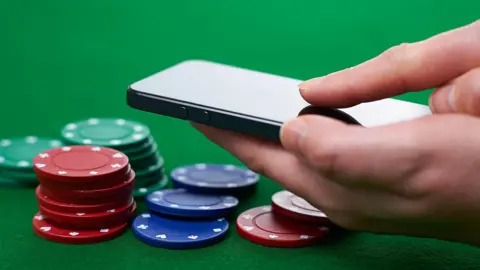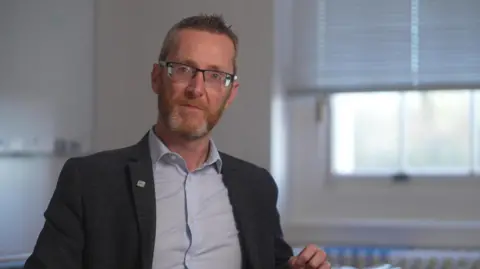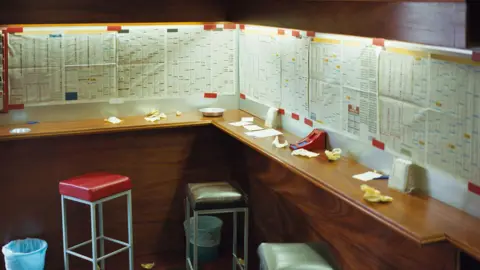Patrick FeeBBC News NI Business correspondent
 Getty Images
Getty Images
Due to a gap in Northern Ireland’s legislation, local bookmakers cannot offer online gambling, meaning gamblers opt for “remote gaming” options such as online slot machines and roulette
The chancellor has been urged to significantly raise taxes on the “most harmful” forms of online gambling by the chair of a Stormont All-Party Group.
“Casino games, slots, roulettes, they’re formulated and designed in a way, they allow opportunities to gamble relentlessly and much quicker than land-based, single sporting events,” Sinn Féin assembly member Philip McGuigan said.
It comes as Rachel Reeves could announce an increase to the rate of tax paid by bookmakers on all online earnings as part of the Budget this week.
A spokesperson for the Betting and Gaming Council said that further rises could endanger betting shops, threatening jobs and weakening the regulated sector.
Due to a gap in the legislation here, local firms aren’t able to offer online gambling, but a number of the UK’s largest bookmakers like William Hill, Ladbrokes and Paddy Power all have online platforms as well as brick and mortar stores in Northern Ireland.
Philip McGuigan told BBC News NI that he has written to the chancellor to urge her to increase taxes on specific forms of gambling like online slots and roulette, which Stormont’s All-Party Group on Reducing Harm Related to Gambling believes are “most harmful”.
‘I have suffered gambling harm’

Philip McGuigan says he has been subjected to “predatory advertising” after self-excluding himself from gambling sites
The Betting and Gaming Council’s chief executive, Grainne Hurst, appeared before Westminster’s Treasury Select Committee in October, denying that gambling created “social harms”.
She added that potential tax hikes risked pushing punters towards “an unregulated black market”.
Philip McGuigan disagreed.
McGuigan told BBC News NI that he has first-hand experience with the addictive and “predatory” nature of online gambling.
“I have suffered at the hands of gambling harm, thankfully everyday now is a day in recovery.”
“There were times, for example when I self-excluded from sites but during that period I was receiving e-mails from the same sites encouraging me back in with free bets, with other types of incentives.
“We have seen that time and time again whether it’s through predatory advertising, predatory e-mails.”
‘Creates more harm than good’
In September, the chancellor hinted that the Autumn Statement may see an increase tax paid on online gambling, telling ITV that “there is a case for gambling firms paying more… they should pay their fair share of taxes and we will make sure that happens.”
While nothing is certain until the Budget is announced on Wednesday, it has long been rumoured that the increase will impact all online gambling equally, harmonising taxes on this type of gambling at a single higher rate.
McGuigan told the BBC that the harmonised rate risked incentivising gambling firms to “cross-sell”, driving punters towards more harmful online games with higher margins of profit.
“There’s obviously a danger here that the chancellor actually makes a change which creates more harm, rather than does good.”
He believes a higher rate of duty would help offset this social harm.
 Getty Images
Getty Images
A spokesman for the Betting and Gaming Council told the BBC that “any further tax rise would put many of Northern Ireland’s betting shops at risk, threatening livelihoods and weakening the regulated sector that protects customers, drives footfall to our high streets and helps sustain local town centres”
The All-Party Group’s stance aligns with a report from the Social Market Foundation, calling for the tax on remote gaming like online slots and casino style games to increase from 21% to 50%, with a lesser increase to the duty on more traditional forms of betting rising from 15% to 25%.
Almost a quarter of Labour MPs, and former Prime Minister Gordon Brown, have called on the Chancellor to increase taxes on gambling firms dramatically to fund the lifting of benefit restrictions on families with more than two children.
Bettors’ winnings aren’t taxed in the UK and bets themselves don’t attract VAT. The industry is currently subject to additional taxes including:
A tax of 21% on online casino gaming stakesDuty of 20% on slots and gaming machinesGeneral betting duty on sports fixtures of 15%General betting duty on horseracing of 15%
Online gambling and gaming now accounts for nearly half of the industry’s takings. Bookmakers have argued that increasing taxes could lead to the closure of hundreds of betting shops and the loss of thousands of jobs.
Earlier this month, a report from the Treasury Committee said that while some gambling was fun and safe, it “rejects the industry’s assertion that gambling causes no social ills”.
The committee said the government should not “cave” to the gambling industry’s “scaremongering” over the potential rise, adding they should tax online betting games “at a rate that reflects the level of harm they inflict”.

